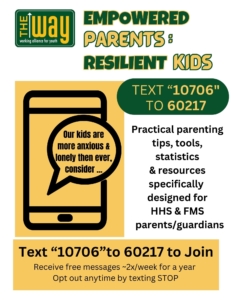SUPPORT FOR PARENTS
As a parent/guardian, you are the biggest influence in your teen’s life. As children spend more time with their friends and talk to parents less, we may imagine they care less about what we think or say. It is critical that you understand the influence and impact you have in your teen’s life. A strong bond with your child, especially during the teen years, helps set the stage for your child’s healthy development into adulthood.
Talking with your teen about unhealthy behaviors and other important, but difficult issues should not be a one-time conversation. The more open, honest, and ongoing these talks are, the more supported your teen will feel. Listening without judgment, showing you care, sharing what you know – and researching together what you don’t, builds trust and keeps communication strong.
Conversation Starters:
General: Ask when you and your teen are alone (ex: in the car, on a walk)
- What topic do you wish we could talk more about?
- Is there anything you’ve been nervous to tell me about recently?
- What’s a challenge you faced this year that you’d like to talk about?
- Is there something about school this year that was particularly hard for you?
- What are the things that my generation doesn’t understand about your generation?
- Are you the same person in all the different areas of your life… with your parents, friends, school, on social media?
- Have you ever been in a situation where you felt uncomfortable about what others were doing?”
Situational:
 Ask when these opportunities are present
Ask when these opportunities are present
- After your teen’s annual physical: I know what you and your doctor discussed is confidential, but is there something you’d like to share with me that I might not know?
- After watching a TV show or movie where a teen is faced with a difficult issue
- There are even low-cost conversation starter games that can be purchased on-line
Conversation Tips:
To keep conversations going with your kids – use OARS skills:
Open-Ended Questions: Ask questions that can’t be answered “yes” or “no” or with just a few words.
Affirm: Find something good in your child’s words or deeds to support. For example, in a conversation about why they may be interested in trying substances, affirm their feelings and empathize with their situation.
Reflect: Repeat your child’s words without inflection to let them know you are listening.
Summarize: Identify the key points you and your child have discussed and transition to another topic or an action that will be taken.
Creating an openness to conversation allows you to offer feedback or guidance in an empathic and non-judgmental manner. Using the “information sandwich” can be helpful. Once you have an understanding of a situation:
- Ask permission to share an idea or recommendation
- Share your idea or recommendation
- Check back for understanding
- Get their feedback
- Repeat
